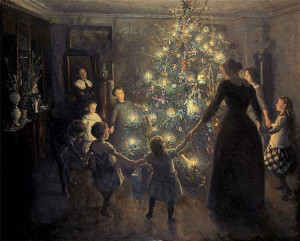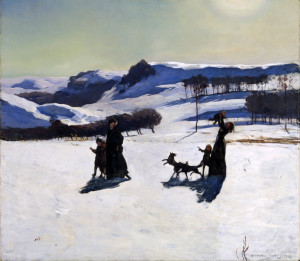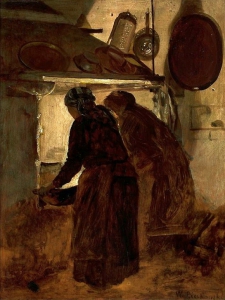And now it is Christmas again. There is an old Swedish Christmas carol, “Nu är Det Jul Igen,” that says just this, and you can count on Swedes around the globe to be singing this very carol this very night. It is usually sung while dancing around the Christmas tree. The song, the dance, the tree aglow in the night… all of these things point toward the fact that this night is not like other nights: This is a night charged with magic. This is something we know deep in our bones. We know it from the time we are little children and we know it when we are old. Christmas Eve offers us a free ride back to that childhood, just a brief visit. We either hop aboard or we do not, but the offer is there.
Christmas has a lot of pressure put upon it. As magical nights go, this is the one most of us connect to. But it’s hard work connecting with that portal. We know the stories that have been passed down through the centuries––that the water in wells turns to wine at midnight on Christmas Eve and that magic lights twinkle at the deepest depths of those wells, that even rivers run with wine at the midnight hour, and that animals are given the power of speech and that they kneel in their barns in the cold night air, in reverence to the divine child that enters our common world. Those who set out to prove the magic are usually punished for doing so and so we do well to leave well enough alone. If the animals are kneeling and speaking, so be it. There is magic more readily available and apparent in the tree, in the lights, in the incense and candles, the cookies and songs we taste and sing just at this time of year.
But we try so hard to make Christmas perfect that sometimes it exhausts us. I think this is because we are so disconnected from the magic, the ceremony, of the everyday. We try to do it all now, in this one magical night, because it is the granddaddy of them all. But one of the most magical things about Christmas is that it comes whether we are ready for it or not. There is another old text, that of a Christmas play from Cornwall that is performed by morris dancers now all over the world. Father Christmas is one of the main players, and he enters, always, with the same words: Here comes I, Old Father Christmas; Welcome or welcome not.
Apparently, even in ancient times in Cornwall, Christmas would come upon us too quickly. A good thing to keep in mind today. The presents may not be all wrapped and the decorations may not be all up and the cards may not be all written and sent… but Christmas comes in its own time, and the magic is that we are swept along into it, and we are powerless in its wake. We are taken up in its quiet procession, and we either fight it or go along with it. If we go along with it, we let go of all that is not perfect and accept it for what it is: A quiet night, full of magic real or imagined. And what is the difference? What does it matter? “Now it is Christmas again.” Certainly there will be some quiet time for you tonight, time when you will sit and realize that all you did not get to do is not done but it’s okay, still it is Christmas. Its time is just beginning. Allow yourself to be immersed in it. Enjoy the magic.
Image: Glade Jul by Viggo Johansen. Oil on canvas, 1891. [Public domain, via Wikimedia Commons.] Johansen was a painter from Denmark, not far from Sweden, and certainly he knew a bit about “Nu är Det Jul Igen.”


